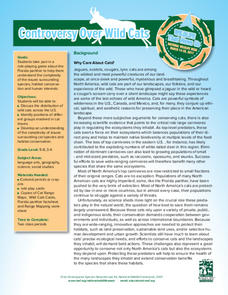NOAA
Importance of Deep-Sea Ecosystems – How Diverse is That?
When judging diversity of an ecosystem, both species evenness and species richness must contribute. After a discussion of diversity and a guided example using the Shannon-Weaver function, scholars use the same function on two other...
Channel Islands Film
Human Impact on the Food Web of Santa Cruz Island
What happens when a non-native species is introduced onto an island? Santa Cruz Island, part of the Channel Island chain located off the coast of southern California, provides the perfect laboratory for young environmental scientists to...
Wilderness Classroom
Ocean Life
Our oceans are composed of many complex relationships. Young oceanographers explore relationships between organisms, understand the world ocean's currents, and discover the effects of water pollution and how it behaves. There are three...
University of Connecticut
Building Your Own Biosphere
On September 26, 1991, four women and four men entered the scientific experiment, Biosphere 2; the doors were sealed for two years in order to study the interactions of a biosphere. In the activity, scholars explore biospheres by...
Cornell Lab of Ornithology
Life In A Nest: Exploring Life Cycles With Bird Cams
Why read about it when you can watch it happen? Bird cams make it possible for learners to experience the life cycle of a bird in real time! An engaging set of lessons provides activities to connect their learning to bird cam...
Howard Hughes Medical Institute
Lesson 7: Observations Across Habitats
How are animals in separate but nearby habitats related? Ecology scholars compare the animal inhabitants of the Gorongosa National Park in part seven of an eight-part series. Learners study photos from two different habitats, then...
American Museum of Natural History
Saving Species
Some scientists dedicate their lives to researching and protecting endangered species. An online lesson teaches about three scientists around the world who do just that. They learn about spiders, mollusks, and reptiles from North...
Curated OER
Rainbow Trout
Students investigate the many varieties of both tropical and freshwater fish, and find out about the anatomy of these creatures. They explore biodiversity in bodies of water, including information about coral reefs, and study the effects...
Curated OER
Pets: Oh Behave
They say that a dog is a man's best friend. Why is that? Discuss with your class why people like pets and the responsibilities with owning one. They read an article about pet behavior and write a short essay comparing one of their...
Howard Hughes Medical Institute
Gorongosa: Making Observations Activity
Do you have young scientists wanting to make new discoveries rather than just completing the same experiments? Young scientists use their observational skills to identify animals and patterns in animal behavior. Through tracking...
Rice University
Biology for AP® Courses
An eight-unit electronic textbook provides a guide to AP® Biology. Each of the 28 chapters include an introduction, multiple lessons, a summary, review questions, and test prep questions. Teachers see how each lesson connects to a big...
Curated OER
Water Will, Water Way
Students complete a unit on biodiversity and their significance to pharmaceuticals. They
Curated OER
Etosha: Poppin' Out at You
Tenth graders research an African animal of their choice and relate the concepts of population, climate and biodiversity to their animal. They examine how population interacts in an ecosystem.
Curated OER
Life Has A History
In this biology instructional activity, students identify and match various classes of species found today. Then they explain why biodiversity exists today on earth and define evolution. Students also describe who a paleontologist is and...
Curated OER
GPS Ecosystem (Ecotone) Scavenger Hunt
Students describe the characteristics of an ecotone. In this ecotone lesson, students pick out their area and describe the visual appearance, conditions, ecosystem, biodiversity, predators, prey, and trees in their ecotone. They create a...
Curated OER
What is Urban Ecology?
Here is a worksheet on Urban Ecology in the state of Arizona. In it, learners answer nine short-answer questions on this topic. The last two questions have them use the reverse side of the paper to create tables and graphs which deal...
National Wildlife Federation
Controversy Over Wild Cats
Everyone should take an interest in the fate of wild cats. A thorough lesson plan explores the habitat changes of native North American wild cats and asks learners to make connections to human development. They consider the implications...
National Science Teacher Association
Middle School Sampler: Science
Focus on inquiry-based learning in your science class with a series of activities designed for middle schoolers. A helpful packet samples four different texts, which include activities about predator-prey relationships, Earth's axis and...
It's About Time
Who Eats Whom?
Packed with visual aids and multiple learning opportunities, an engaging exercise challenges individuals as they explore the role of producers, consumers, and decomposers. After discussing differences between food chains, food...
NOAA
Calling All Explorers
Let's get moving! The second installment of a 2-part series of six adventures helps learners take part in individual explorations by sea and by land. After navigating the waters in an informative WebQuest, groups create and hide their...
NOAA
Journey to the Unknown
What's it like to be a deep-sea explorer? Tap into the imaginations of your fifth and sixth graders with a vivid lesson, the second part of a six-part adventure. Learners close their eyes and submerge themselves in an expedition aboard...
Channel Islands Film
Restoration Channel Islands Debate
Introduce learners to the debate format with an activity that uses the National Park Service's controversial Channel Islands restoration program as a topic. Class members learn how to generate provocative debate questions, how to prepare...
Channel Islands Film
Magic Isle: Lesson Plan 1
What are the factors that limit growth and expansion? As part of their study of Catalina Island, class members view the West of the West's documentary Magic Isle and research William Wrigley and the Santa Catalina Island Company. After...
NOAA
Deep-Sea Corals
Come take a peak at the corals in the deep. Science scholars discover the hidden world of deep-sea corals in the third installment of a 13-part series. Topics include the differences between shallow water and deep-sea corals, the slow...
Other popular searches
- Biodiversity and Ecosystems
- Biodiversity in Forests
- Biodiversity Loss
- Insect Biodiversity
- Great Lakes Biodiversity
- Marine Biodiversity
- Biodiversity of Fish
- Climate and Biodiversity
- Global Biodiversity
- Hall of Biodiversity
- Biodiversity in Utah
- Biodiversity Bingo

























